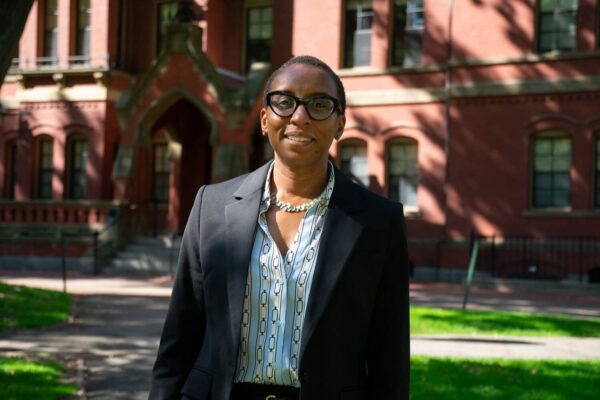Harvard University President Claudine Gay, who last year became the first Black leader in the school’s 386-year history, faced fierce criticism from House lawmakers on Tuesday during an intense hearing to address growing anti-Semitism on some U.S. college campuses amid the Israel-Hamas war.
The presidents of the University of Pennsylvania and the Massachusetts Institute of Technology also faced a thorough grilling from members of the House Education Committee, but it was Gay who appeared to be the primary target of Republicans who sought to slam her leadership after less than six months on the job.
During the roughshod questioning, led by Rep. Elise Stefanik of New York, Gay repeatedly denounced anti-Semitism, but she acknowledged that Harvard had “not always gotten it right” in confronting racial and cultural issues that have emerged since she joined the university as a professor in 2006.

“This is difficult work, and I admit that we have not always gotten it right,” Gay said. “As Harvard’s president, I am personally responsible for confronting anti-Semitism with the urgency it demands.”
Stefanik, also a Harvard alum, was Gay’s most vocal critic during the proceedings, calling for her resignation as she and other House Republicans pressed the educator for clarity on her stance regarding Israel’s sovereignty and whether some students on the Harvard campus had violated the code of conduct by openly calling for “intifada” — or an uprising against Israeli occupation in Gaza — during recent protests.
“It is at odds with the values of Harvard,” Gay said. “We embrace a commitment to free expression, even of views that are objectionable, offensive, hateful.”
While Gay faced blistering questions, her peers, including MIT President Sally Kornbluth, Penn President Liz Magill, and American University professor Pamela Nadell — all of whom are white—faced few, if any, pointed questions from the panel.
During the hearing, Gay, Magill, Kornbluth, and Nadell denounced antisemitism and condemned the Hamas attack on Israel amid a groundswell of criticism that arose on Capitol Hill this week over whether the schools were being too soft on incendiary speech as some students had called for the genocide of Jews.
On Wednesday, Harvard posted a statement to X from Gay about the ballooning controversy, saying, “There are some who have confused a right to free expression with the idea that Harvard will condone calls for violence against Jewish students. Let me be clear: Calls for violence or genocide against the Jewish community or any religious or ethnic group are vile, they have no place at Harvard, and those who threaten our Jewish students will be held to account.”
At the hearing, Stefanik asked Gay if she had taken any action to expel the students calling for the destruction of Israel on the campus.
Gay responded by citing the school’s policies on harassment and bullying but noted that she could not provide detailed information about specific student discipline matters.
Gay did note, however, that “disciplinary processes are underway” regarding the recent protests, but she did not elaborate.
“When speech crosses into conduct that violates our policies, including policies against bullying, harassment or intimidation, we take action,” Gay said. “We have robust disciplinary processes that allow us to hold individuals accountable.”
Stefanik, however, said she found the response insufficient and called out Harvard for ranking “the lowest when it comes to protecting Jewish students.”
“This is why I’ve called for your resignation, and your testimony today — not being able to answer with more parity — speaks volumes,” Stefanik said.
Later, Stefanik was flummoxed when Magill gave a similar response on whether calls for genocide on campus violated the student code of conduct.
“It is a context-dependent decision,” Magill answered, to which Stefanik incredulously replied: “That’s your testimony today? Calling for the genocide of Jews is dependent on the context? That is not bullying or harassment? This is the easiest question to answer yes for.”
The hearing turned more contentious as several House Republicans deferred their remaining time over to Stefanik to continue her barrage against Gay.
In one exchange, Stefanik pressed Gay on why Harvard declined to display the flag of Israel but permitted the Ukrainian flag to fly on campus. She also questioned whether Gay was informed about stickers placed on food items on campus that allegedly advocated for “Israeli apartheid.”
At another point, Stefanik asked Gay to answer “yes or no” to whether chants by students to destroy Israel were protected free speech as pro-Palestinian protests have gripped the campus since the Middle East war began on Oct. 7.
Stefanik continued to admonish Gay, but the educator remained firm that she felt the chants calling for the destruction of Israel were “thoughtless, reckless and hateful language.”
Stefanik went further, asking Gay whether she agreed that a call for “intifada” was equivalent to “calling for the mass murder of African-Americans.”
“You are president of Harvard, so I assume you’re familiar with the term ‘Intifada,’ correct?” Stefanik asked Gay, who agreed before Stefanik continued, “Then you understand that the use of the term ‘intifada,’ in the context of the Israeli-Arab conflict, is indeed a call for violent armed resistance against the state of Israel, including violence against civilians and the genocide of Jews?”
In response, Gay said, “That type of hateful speech is personally abhorrent to me.”
In response to a separate question from Republican Rep. Kevin Kiley of California, Gay said she should have responded differently to a letter from student groups that blamed Israel for the Hamas attacks and attributed the statement to the university.
“Had I known that the statement issued by the students would’ve been wrongly attributed to the university, I would have spoken sooner about it,” Gay said. “But I was focused on action that weekend, not statements.”
Republican advocates, meanwhile, sought to take advantage of the divisive moment, with conservative political commentator Dave Rubin declaring on social media that Harvard should change its name to “Hamas University.”
In a message posted to X, hedge fund billionaire Bill Ackman also called on the education officials to “resign in disgrace,” saying that they held a “profound disdain for the Congress with their smiles and smirks, and their outright refusal to answer basic questions with a yes or no answer.”
During the hearing, House Education and Workforce Chair Virginia Foxx, a North Carolina Republican, called Harvard “ground zero for anti-Semitism” since the latest outbreak of war in the Middle East.
Virginia Rep. Bobby Scott, who is the top Democrat on the committee, said the ongoing student protests were polarizing yet a recurring theme in American political discourse.
“To be clear, this discrimination is nothing new,” Scott said to open the hearing. “Any student of history knows that it did not start with the Oct. 7 attacks or diversity, equity, and inclusion initiatives, or any one new event. My colleagues would do well to recall this country has a centuries-long history of racism and white supremacy.”
Gay is the 30th president of Harvard University, where she received her doctorate in government in 1998.
She is also the first Black person and just the second woman ever to hold the position at the premier Ivy League school.
The 53-year-old educator joined the faculty in 2006 as a government professor with a specialization in African and African-American studies.
Before that, she was an assistant professor of political science at Stanford University, where she received her bachelor’s in economics in 1992.
She has been at the helm at Harvard since July.


